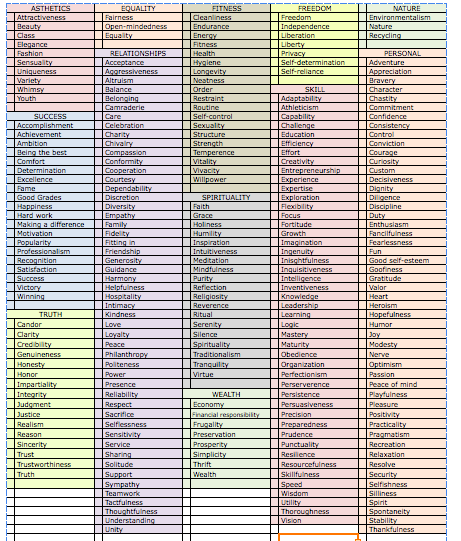When we set about a giant task like fulfilling our dreams, people often start with the wrong question: what makes me happy? But happiness is a mind-set and can be achieved no matter your circumstance. Poor people can be happy. Sick people can be happy. Childless people who want children can be happy.
The keys to happiness are 1) gratitude, and 2) no expectations. Read Dennis Prager’s excellent book, Happiness is a Serious Problem, if you want to change your mind-set.
Whether you’re happy or not (and I hope you are), you might still be searching for a greater purpose in life, something to fulfill and sustain you. Pursuing a dream can do that. But how do you know what dream to pursue?
The easiest way to be fulfilled is to know who you are. You need to figure out what’s important to you, what your values and priorities are. Because when we’re doing things that support those values and priorities, it brings us inner peace. Let me give an example.
If you start with the premise, “What Makes Me Happy?”, you might answer, “Chocolate cake.” Cake tastes good and makes you feel good in the moment. But every time you eat a piece of cake, maybe the momentary pleasure is replaced with guilt. You’re trying to lose ten pounds. Your doctor wants you to cut back on sugar. You feel tired all the time and know that you need to focus on your health. So that thing that made you happy…it really didn’t.
If you start with the premise, “What’s important to me?”, you might answer, “My health.” So instead of dessert every night after dinner, you take a 20-minute walk. You might hate the walk. It might make you tired. But as you’re lying in bed at night and going over the events of the day…you smile. You made yourself walk. You made your health a priority. You have inner peace.
That’s not to say you shouldn’t have cake, even if your health is a priority. We all need rewards. But once-a-month cake (rather than nightly cake) still keeps your priorities in check.
Over the years, I’ve compiled a list of personal values. You can download it HERE – PERSONAL VALUES.XLSX spreadsheet, and use it as you see fit. Here’s a screen shot:
At first glance, you might think that all of these values are important. To a certain degree, they are. But everyone is unique in their priorities and approach to life. You need to figure out what’s MOST important.
Read through the lists. Some of the words are redundant, some have subtle nuances. Some can be categorized in multiple lists. Feel free to move them around or ignore the categories entirely. The categories don’t really matter; they’re just for simplicity’s sake.
Now choose your top twenty. Whittle those twenty down to ten. Then to five. You’re going to focus on those five. And that doesn’t mean you’ll ignore the rest, but you have to start somewhere. And we’re talking about DREAMS. Dreams are pretty damn important, and should be connected to your top priorities.
Now that you’ve got your top five, you need to translate them to achievable dreams. Here’s an example:
Maybe my top five personal values are FAMILY, FITNESS, KNOWLEDGE, FREEDOM, and NATURE.
Let’s start with FAMILY. How do I make FAMILY a priority? Brainstorm a few ideas and write them down. Your list might look like this:
1. Create memories.
2. Be the kind of parent my kids will want to emulate.
3. Pass on traditions and knowledge of the past. (Nicely ties in with KNOWLEDGE value.)
Now under each item, list actionable tasks that will accomplish those goals.
1. Create memories.
a. Plan an annual family vacation.
b. Visit the grandparents 3x/year.
c. Weekly game night.
d. Create a photo slide-show for their birthdays every year.
2. Be the kind of parent my kids will want to emulate.
a. Give daily praise and affection.
b. Attend all of my kids’ baseball games (even the early-morning Saturday ones!).
c. Read and snuggle together every night before bed.
3. Pass on traditions and knowledge of the past.
a. Create a recipe book for each kid including Grandma’s recipes.
b. Bake cookies every holiday.
c. Start an annual pumpkin-carving party for the neighborhood.
d. Scan all of Grandma’s photos and give copies to each kid.
Now you’re thinking…this isn’t what I had in mind when I thought of FULFILLING MY DREAMS.
But actually…it is.
If your greatest priority is FAMILY, and for many of us, it is…don’t you have dreams about having the greatest family in the world? One where the kids come home from school, even the teenagers, give you a big hug, and tell you all about their day? One where your partner sings your praises and tells everyone at work how lucky they are to be married to you? One where you love each other, support each other, and communicate often and openly?
Let’s face it – those things don’t happen by accident. They take work and dedication. Those families are a dream for many of us. Don’t ignore these types of dreams in favor of things more grandiose. Because the daily, the familiar (like family, friendships, a support network) are crucial if we want to pursue anything more grandiose.
But let’s address the grandiose.
Maybe you always wanted to be a dancer. Or a singer. Or write a book. Or get your masters degree. Any one of those could fit into our top five personal values. Let’s go with the example of getting your masters degree.
In this case, it could fit into KNOWLEDGE (increasing your personal knowledge), FAMILY (it can open up job opportunities that would increase your family’s income), or FREEDOM (you just always wanted a masters, damn it, and you want to be free to get one; or, the extra money you make at work with the degree will give you more financial freedom).
But how do you know if pursuing your masters degree is really your dream?
1. There’s no right or wrong. There’s no wrong dream. But if you’re going in one direction and decide it’s not right for you, that’s fine. You can always change.
2. Work backwards. A masters degree is typically a means to an end – more knowledge, a better job, greater income. (Yes, some people want an advanced degree for its own sake, but that’s not what I’m talking about). So it’s easier to look at your life and priorities and think, “What is the outcome I want?” than to first think, “How do I get there?” You need to know where you’re going first. Then you can figure out the best steps to take to make it happen.
3. What do you want to be remembered for? When you’re dead and gone, what do you want your partner to think about you? What do you want your kids to tell their grandkids about you? What legacy do you want to leave?
4. What can you live with? We all have regrets – anyone who says they don’t is lying to themselves. (But we can turn those regrets into learning experiences, and we don’t have to dwell on them.) Still…live with the fewest regrets possible. Are you going to look back one year, ten years, twenty years from now and say, “I should have done that!”? Then that’s the thing you need to do.
5. Dreams take effort and time and energy. They take us away from other things. That’s why it’s so crucial to have your priorities in order. Don’t let your dream of being a rock star kill your dream of being a good parent. You might regret that.
6. Re-evaluate your list of personal values every year or so. Priorities change. Circumstances change. Be flexible.
This is just a start, a way to get you thinking about what’s important to you. Making the dream a reality is the tough part, and we’ll talk about that as this series progresses. But for now, grab a journal or open a new Word doc and just think. Brainstorm. Figure out who you are and what you want. Dream.


